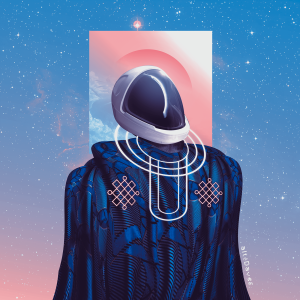“We live in capitalism. Its power seems inescapable. So did the divine right of kings. Any human power can be resisted and changed by human beings. Resistance and change often begin in art, and very often in our art, the art of words.”
― Ursula K. Le Guin
“The stories that we tell have tremendous transformative power. They stay with us and help shape who we decide to become, what we decide to do, and how we choose to move forward and create change in our realities.”
― Johnnie Jae

Afrofvtvre by David Adamu
Last year at The Geek Anthropologist we piloted a new format for us: anthropological fiction. If you’ve read the installations of Savannah Mandel’s Moon Monogamy (And Other Things That are Bound to Go Wrong) then you know what a fun romp that has been, and this year will bring us the conclusion of Asimov Jones’ investigations.
This is where you come in. We’d like to keep this speculative fiction train rolling, and we need your help to do it. We are looking for submissions of speculative fiction in any format imaginable: short stories, flash fiction, serialized fiction, D&D modules, larp scenarios, video, audio, Twine games, or anything else you can come up with. Of course, being The Geek Anthropologist, we’re looking for fiction that engages anthropological themes: intersectional and critical works that take us to other worlds, that help us all to imagine better visions of this world and, in imagining them, begin to build them.
We’re especially interested in work that connects with Afrofuturism and Indigenous Futurism, things like Skawenatti’s TimeTravellertm, Darcie Little Badger’s Strangelands, Rebecca Roanhorse’s Trail of Lightning, or Tomi Adeyemi’s Children of Blood and Bone. Johnnie Jae, founder of A Tribe Called Geek, has described Indigenous Futurism as the polar opposite of mainstream futurism:
Unlike mainstream science fiction, where futurism is typically violent and values the advancement of technology over both nature and human beings, Indigenous sci-fi is the polar opposite. We imagine worlds where the advancement of technology doesn’t disrupt or destroy ecosystems or the balance of power between humans and nature. Even in stories where we are exploring alien worlds, we think about how we can co-exist with the life forms indigenous to that world. We think about the ways our cultures, languages, and everything that makes us who we are can be preserved and how they can evolve in these new worlds.
How to Contribute
This call is open and ongoing. Send your pitch or manuscript sample to thegeekanthropologist@gmail.com. Be sure to include:
- A summary of the work
- What anthropological issues the work explores
- An explanation of the format and length you have in mind
- A brief bio (100-200 words)





[…] and the Zoomification of our personal and professional lives. We also launched our “Anthropological Speculative Fiction” section of the website (which is an ongoing initiative into 2021 and beyond). Since time […]
LikeLike